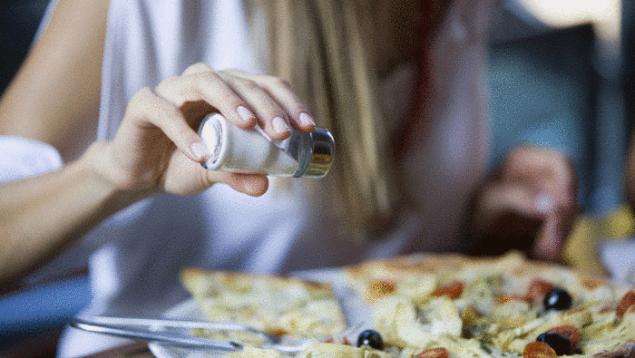645
Myths and facts about the dangers of monosodium glutamate
This spring the deputies of the State Duma once again showed me that they care about their fellow citizens. This time lawmakers are seriously worried about the health of the population and has proposed to limit the use of the food additive "monosodium glutamate", referring to the results of the research about its harm to health. The public reaction was quite predictable – producers worried that consumers delighted. But representatives of the scientific community only smiled indulgently rampant ignorance in matters of food, but still explained why a ban of this nutritional supplements makes no sense.

To our questions about the safety of food additives said Gennady Tents, Head of Laboratory hygienic research of food additives INSTITUTION "Institute of nutrition" RAMS.
Revision: Why, among all the dietary supplements a heated debate it caused monosodium glutamate? There were some new data about its dangers?
Tents: it is Difficult to say why monosodium glutamate. Probably because this Supplement is widely used in modern manufacturing and the consumer faced with this name than with others. Other reasons, especially scientific, I do not see here.
Periodically, negative publicity and other supplements even such harmless as citric, lactic acid. Maybe this is partly due to competition between manufacturers. Some want to position your product as the best, the best, because it contains no monosodium glutamate. And it needs to publicly state that monosodium glutamate harmful to health, even if there is no serious justification for this.
The results of those studies, which recently referred to the State Duma deputies, determine the effect of sodium glutamate on the nervous system. I looked at the abstract study of the effect of monosodium glutamate on the optic nerve: in the experiment, 50% of the experimental diet was replaced with glutamic acid. This is not a scientific approach. The methodology for such studies prefigured: to conduct research with real levels of the substance. The same experiment can be conducted with any other ingredient, e.g. sugar. If a person will consume 50 grams of sugar per day, and 100 g or more, it is possible to guarantee that in 5 years it will have diabetes.
The scientific community is pretty free and democratic, and everyone is free to put all sorts of experiences. But if you put the experience in order to determine this substance is harmful or not, it is important to use an approved methodology: acute, subacute and chronic experiments and other special experiments on animals.
Revised: What is this nutritional Supplement?
Tents: monosodium Glutamate is a sodium salt of glutamic acid. And glutamic acid is an amino acid that is present in all proteins of vegetable and animal origin, e.g. meat and cereals. So the daily with food of natural origin, we get much more glutamic acid than supplements. The baby begins to consume its mother's milk.
And sodium we consume much more with simple table salt. Therefore, it is not clear General fear of sodium glutamate.
Revision: Often opponents of monosodium glutamate telling his narcotic effect. Supplement causes a sense of euphoria, further addictive?
Tents: Narcotic effect of monosodium glutamate – is a myth. Think about it, if it were a drug, our bodies would have long ago banned this food additive, which, for example, in Japan, used as a condiment.
It does not cause a state of euphoria, and addiction can cause any product. Get used to the chocolate, and then can't live a day without him. Some getting used to spicy dishes and not eat the food, not its seasoned pepper and mustard. It is the individual habits of people.
And of course the abuse of any food will eventually cause health problems. The basic principle of nutrition is that all you can eat, but know when to stop. Very often monosodium glutamate is used in quickly cooked food. But in this case, people get used to this fast food, not dietary Supplement.
Some children can't live a day without Coca-Cola, but that does not mean that we should ban the drink. You just need to follow the diet of the child, until he understands.
Editorial: And when the this Supplement? At which point it began to be used in production?
Tents: the Practice of using MSG came from South-East Asia. There are mainly in China, Thailand, Vietnam, used glutamic acid, not knowing what the name of this substance. In the dishes of these countries was traditionally used the so-called fish sauce. The technology of preparation of such a sauce leads to enzymatic breakdown of proteins in fish. Since glutamic acid in fish sufficient, the sauce acquires a specific taste and smell, enhances the taste of other fish and meat dishes.
Supplement in pure form was isolated in the early 19th century, the Japanese called "special flavor" called "umami." Later, in China and Japan began mixing glutamic acid and salt to put on the table as a table condiment.
In Russia, this food additive is used in the production of meat, fish and sauces. The main objective is to improve the taste and flavor of the product.
To make it clearer, give an example. We all love kebabs. The meat is marinated before grilling, the marinade is acidic environment in which there is a partial decomposition of the protein and the formation of glutamic acid. Therefore, when heat treatment such meat a very special flavor. A similar effect is achieved by the use of monosodium glutamate in the production.
The editors And producers are there any restrictions on the amount of MSG that they can add to the product?
Tents: This Supplement does not represent a Toxicological risk, therefore, allowed for almost all kinds of food, but for technological reasons.
For food products the amount of this additive is limited to 1% to 10 g per 1 kg of the sauces — "according to TD", ie according to process documentation as needed.
Evaluation of all food additives without exception occurs at the international level. There is such an organization – the joint Committee FAO/who on food additives and contaminants. This Committee includes scientists from many countries, including from Russia. They discuss all the available data about a specific dietary Supplement. Their task is to determine the acceptable daily dose that can eat a man without harm to health throughout life. Considered, in what products can be used this dietary Supplement, what is an average number of this product can use.
For those additives that do not pose Toxicological risks, for example, monosodium glutamate – this value is large. But this does not mean that the manufacturer should provide this recommended amount. It should not exceed this value, but to lay as long as necessary for technological effect. Most often it is fewer dietary supplements because after you achieve the desired effect, it makes no sense to add more than necessary. It is not profitable to the manufacturer.
Editorial: How is the recommended daily dose?
Tents: On several generations of experimental animals held various Toxicological studies. The input dose of the substance is increased gradually. In the experiment, find that the dosage that does not adversely impact on the animal. Then reduce the dosage to 100 times. The resulting value becomes the acceptable daily dose.
Edition: however, there are categories of people who should avoid this nutritional Supplement?
Tents: Perhaps only children up to 3 years. There is a list of food additives that are permitted for use in the production of baby food up to 3 years. The list is limited: can only be used citric, ascorbic, lactic acid and some dietary supplements. And after 3 years it is believed that the child can eat from the common table.
Editorial: Why there are such limitations to 3 years?
Tents: Many dietary supplements are alien compounds to the human body. Ie the human body not found in nature with these compounds. For example, some synthetic dyes, antioxidants. And the metabolism and clearance of foreign compounds is influenced by the enzyme systems of the liver, is the neutralization and excretion from the body. In children these enzyme systems are not developed enough to 3 years reach a level that can cope with these compounds.
Some food additives are prohibited, even in school feeding, for example, benzoine and sorbic acid. Although with this I do not quite agree. These acids, like monosodium glutamate, are not alien compounds, they are found in cranberry, Aronia melanocarpa.
Editorial: the safety of monosodium glutamate You have convinced me. Maybe he is also something useful?
Tents: Any special health benefits in this Supplement no. We get enough protein, i.e. monosodium glutamate with food.
This Supplement is necessary for the technologists to enhance the flavor and smell of the product.
The cost of a food product depends on the raw material that is used. If you are using superior raw materials, and finished product is appropriate. If the raw material, which meets all hygienic requirements, but with a less pronounced taste, the addition of monosodium glutamate to such raw material is justified, because the person who buys, say, cheap sausages, also needs to enjoy this sausage. But if it is poor quality product, then the law prohibits the use of food additives to disguise this product.
Editorial: If You offer 2 kinds of sausage – one with the addition of monosodium glutamate and the other without, which would you choose?
Tents: I won't choose the sausage on the content of monosodium glutamate. Will you focus on your preferences. I have become accustomed to certain varieties, the producers, and they will choose.
Edition: And in General on the composition You see? You pay attention to when buying?
Tents: On the composition rarely looking. If the food products released in a lawful manner, with application of all existing rules and regulations, it is safe for health. In General, the products that are available in large chain stores, this is. In the spontaneous markets guarantee.
I often pay attention to the expiration date not to buy the product, the shelf life of which expires in a day. The hitters have a tendency to put a product with a longer life on the back rows and leave the products with the expiry date.
I think that's the most pressing problem. Expired product there is a real danger of poisoning, and poisoning of food additives, including monosodium glutamate, I've never met.
Editorial: How real do You think a ban on monosodium glutamate in Russia?
Tents: Suppose that over time, Russia may form a kind of lobby, and monosodium glutamate banned. This will limit the import of products from Europe. But after joining the WTO, we legally have no right to ban products from other countries without a valid reason. But the WTO has a fairly strict approach – if there is no scientific evidence about the dangers of the product, then imposed significant fines on the country. And in fact such data via the glutamate is not. So I'm not sure that we take that unwarranted step.
источник:chtoestchto.ru
Source: /users/78

To our questions about the safety of food additives said Gennady Tents, Head of Laboratory hygienic research of food additives INSTITUTION "Institute of nutrition" RAMS.
Revision: Why, among all the dietary supplements a heated debate it caused monosodium glutamate? There were some new data about its dangers?
Tents: it is Difficult to say why monosodium glutamate. Probably because this Supplement is widely used in modern manufacturing and the consumer faced with this name than with others. Other reasons, especially scientific, I do not see here.
Periodically, negative publicity and other supplements even such harmless as citric, lactic acid. Maybe this is partly due to competition between manufacturers. Some want to position your product as the best, the best, because it contains no monosodium glutamate. And it needs to publicly state that monosodium glutamate harmful to health, even if there is no serious justification for this.
The results of those studies, which recently referred to the State Duma deputies, determine the effect of sodium glutamate on the nervous system. I looked at the abstract study of the effect of monosodium glutamate on the optic nerve: in the experiment, 50% of the experimental diet was replaced with glutamic acid. This is not a scientific approach. The methodology for such studies prefigured: to conduct research with real levels of the substance. The same experiment can be conducted with any other ingredient, e.g. sugar. If a person will consume 50 grams of sugar per day, and 100 g or more, it is possible to guarantee that in 5 years it will have diabetes.
The scientific community is pretty free and democratic, and everyone is free to put all sorts of experiences. But if you put the experience in order to determine this substance is harmful or not, it is important to use an approved methodology: acute, subacute and chronic experiments and other special experiments on animals.
Revised: What is this nutritional Supplement?
Tents: monosodium Glutamate is a sodium salt of glutamic acid. And glutamic acid is an amino acid that is present in all proteins of vegetable and animal origin, e.g. meat and cereals. So the daily with food of natural origin, we get much more glutamic acid than supplements. The baby begins to consume its mother's milk.
And sodium we consume much more with simple table salt. Therefore, it is not clear General fear of sodium glutamate.
Revision: Often opponents of monosodium glutamate telling his narcotic effect. Supplement causes a sense of euphoria, further addictive?
Tents: Narcotic effect of monosodium glutamate – is a myth. Think about it, if it were a drug, our bodies would have long ago banned this food additive, which, for example, in Japan, used as a condiment.
It does not cause a state of euphoria, and addiction can cause any product. Get used to the chocolate, and then can't live a day without him. Some getting used to spicy dishes and not eat the food, not its seasoned pepper and mustard. It is the individual habits of people.
And of course the abuse of any food will eventually cause health problems. The basic principle of nutrition is that all you can eat, but know when to stop. Very often monosodium glutamate is used in quickly cooked food. But in this case, people get used to this fast food, not dietary Supplement.
Some children can't live a day without Coca-Cola, but that does not mean that we should ban the drink. You just need to follow the diet of the child, until he understands.
Editorial: And when the this Supplement? At which point it began to be used in production?
Tents: the Practice of using MSG came from South-East Asia. There are mainly in China, Thailand, Vietnam, used glutamic acid, not knowing what the name of this substance. In the dishes of these countries was traditionally used the so-called fish sauce. The technology of preparation of such a sauce leads to enzymatic breakdown of proteins in fish. Since glutamic acid in fish sufficient, the sauce acquires a specific taste and smell, enhances the taste of other fish and meat dishes.
Supplement in pure form was isolated in the early 19th century, the Japanese called "special flavor" called "umami." Later, in China and Japan began mixing glutamic acid and salt to put on the table as a table condiment.
In Russia, this food additive is used in the production of meat, fish and sauces. The main objective is to improve the taste and flavor of the product.
To make it clearer, give an example. We all love kebabs. The meat is marinated before grilling, the marinade is acidic environment in which there is a partial decomposition of the protein and the formation of glutamic acid. Therefore, when heat treatment such meat a very special flavor. A similar effect is achieved by the use of monosodium glutamate in the production.
The editors And producers are there any restrictions on the amount of MSG that they can add to the product?
Tents: This Supplement does not represent a Toxicological risk, therefore, allowed for almost all kinds of food, but for technological reasons.
For food products the amount of this additive is limited to 1% to 10 g per 1 kg of the sauces — "according to TD", ie according to process documentation as needed.
Evaluation of all food additives without exception occurs at the international level. There is such an organization – the joint Committee FAO/who on food additives and contaminants. This Committee includes scientists from many countries, including from Russia. They discuss all the available data about a specific dietary Supplement. Their task is to determine the acceptable daily dose that can eat a man without harm to health throughout life. Considered, in what products can be used this dietary Supplement, what is an average number of this product can use.
For those additives that do not pose Toxicological risks, for example, monosodium glutamate – this value is large. But this does not mean that the manufacturer should provide this recommended amount. It should not exceed this value, but to lay as long as necessary for technological effect. Most often it is fewer dietary supplements because after you achieve the desired effect, it makes no sense to add more than necessary. It is not profitable to the manufacturer.
Editorial: How is the recommended daily dose?
Tents: On several generations of experimental animals held various Toxicological studies. The input dose of the substance is increased gradually. In the experiment, find that the dosage that does not adversely impact on the animal. Then reduce the dosage to 100 times. The resulting value becomes the acceptable daily dose.
Edition: however, there are categories of people who should avoid this nutritional Supplement?
Tents: Perhaps only children up to 3 years. There is a list of food additives that are permitted for use in the production of baby food up to 3 years. The list is limited: can only be used citric, ascorbic, lactic acid and some dietary supplements. And after 3 years it is believed that the child can eat from the common table.
Editorial: Why there are such limitations to 3 years?
Tents: Many dietary supplements are alien compounds to the human body. Ie the human body not found in nature with these compounds. For example, some synthetic dyes, antioxidants. And the metabolism and clearance of foreign compounds is influenced by the enzyme systems of the liver, is the neutralization and excretion from the body. In children these enzyme systems are not developed enough to 3 years reach a level that can cope with these compounds.
Some food additives are prohibited, even in school feeding, for example, benzoine and sorbic acid. Although with this I do not quite agree. These acids, like monosodium glutamate, are not alien compounds, they are found in cranberry, Aronia melanocarpa.
Editorial: the safety of monosodium glutamate You have convinced me. Maybe he is also something useful?
Tents: Any special health benefits in this Supplement no. We get enough protein, i.e. monosodium glutamate with food.
This Supplement is necessary for the technologists to enhance the flavor and smell of the product.
The cost of a food product depends on the raw material that is used. If you are using superior raw materials, and finished product is appropriate. If the raw material, which meets all hygienic requirements, but with a less pronounced taste, the addition of monosodium glutamate to such raw material is justified, because the person who buys, say, cheap sausages, also needs to enjoy this sausage. But if it is poor quality product, then the law prohibits the use of food additives to disguise this product.
Editorial: If You offer 2 kinds of sausage – one with the addition of monosodium glutamate and the other without, which would you choose?
Tents: I won't choose the sausage on the content of monosodium glutamate. Will you focus on your preferences. I have become accustomed to certain varieties, the producers, and they will choose.
Edition: And in General on the composition You see? You pay attention to when buying?
Tents: On the composition rarely looking. If the food products released in a lawful manner, with application of all existing rules and regulations, it is safe for health. In General, the products that are available in large chain stores, this is. In the spontaneous markets guarantee.
I often pay attention to the expiration date not to buy the product, the shelf life of which expires in a day. The hitters have a tendency to put a product with a longer life on the back rows and leave the products with the expiry date.
I think that's the most pressing problem. Expired product there is a real danger of poisoning, and poisoning of food additives, including monosodium glutamate, I've never met.
Editorial: How real do You think a ban on monosodium glutamate in Russia?
Tents: Suppose that over time, Russia may form a kind of lobby, and monosodium glutamate banned. This will limit the import of products from Europe. But after joining the WTO, we legally have no right to ban products from other countries without a valid reason. But the WTO has a fairly strict approach – if there is no scientific evidence about the dangers of the product, then imposed significant fines on the country. And in fact such data via the glutamate is not. So I'm not sure that we take that unwarranted step.
источник:chtoestchto.ru
Source: /users/78






















